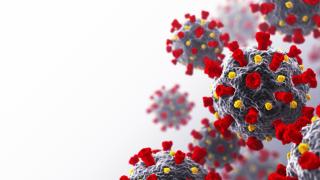While all of us live in the shadow of COVID-19, few are as vulnerable to this virus as bone marrow transplant (BMT) patients. How is City of Hope protecting BMT patients within the hospital, and how can they stay safe once they return home?
To learn more, we spoke with BMT expert Nicole A. Karras, M.D., a pediatric hematologist/oncologist at City of Hope. She began by explaining what creates increased risk after a transplant.
“When you have a bone marrow transplant, you’ve been given a brand new immune system, which must learn how to fight off infections all over again,” she said. “On top of that, you must take medications that further suppress the immune system so that it won’t reject the transplant.”
Patients can remain vulnerable to infections for a year or more after transplant, so special precautions have always been necessary — even against the common cold. Now, with a virus we don’t yet fully understand, patients must take even greater care to safeguard their health.
BMT InPatients at City of Hope
Allogeneic BMT patients, who receive their transplant cells from donors, typically remain in the hospital for about six to eight weeks after transplant. Autologous BMT patients, whose own healthy cells are used, stay for two or three weeks.
Even in normal times, anyone entering a patient’s room has to wash their hands and wear a mask and gloves. And all rooms are positive-pressure, meaning that when you open a door, the air from inside the room is pushed out.
Since the onset of the COVID pandemic, additional measures have been taken throughout City of Hope. All non-essential staff now work from home, rigorous health screening is in place for anyone who must enter the facilities and patients can no longer have visitors — with few exceptions, including allowing one parent or guardian for pediatric patients.
“We used to let Mom and Dad switch off as often as they wanted, and we’d even let both of them stay together,” said Karras. “Now only one parent can stay, and unless there are special circumstances, they cannot switch. They also can’t leave and then come back.”
These new safety precautions have been extremely effective.
“Everyone adheres to these guidelines,” said Karras. “They have enabled us to continue to provide exceptionally safe care during this time.”
Precautions for BMT Patients at Home
For about a year following transplant, BMT patients always have been encouraged to stay home as much as possible and avoid large gatherings, but were generally permitted to shop for groceries, attend outdoor events, return to school and enjoy activities that involved small groups of people.
Now, if you’re a BMT patient, you must not only follow the same COVID restrictions that apply to most of us, but the more recent your transplant, the more rigorously you must observe them. Stay at home, regularly disinfect surfaces, avoid even small groups of people, wash your hands frequently and don’t touch your eyes, nose or mouth. If you must have contact with someone outside of your household, wear a mask and don’t be embarrassed to insist they do the same. And at the first sign of a respiratory infection, contact your physician.
“Patients should also make sure the people around them, the people they live with, are more careful than they might have been otherwise,” said Karras.
How cautious should patients be? The parents of one patient changed their clothes in the garage before entering the house whenever they returned from the outside world.
“That may be taking it a bit too far,” she said, “but if it reduces the level of stress for everyone, then it might be helpful.”
The Importance of Managing Stress
Stress can weaken the immune system, and BMT patients are experiencing a much greater level of anxiety because of COVID-19. Karras emphasized how important it is to communicate any concerns to your doctor.
“Here at City of Hope we have a really well-integrated team, so we can put patients directly in touch with a social worker or psychologist who’s trained to help decompress those feelings,” said Karras.
And no matter what the cause of stress, help is available.
One patient, a 23-year-old woman, returned to her job in a shop that was allowed to remain open, but she was worried about the amount of interaction she had with the store’s clientele.
“We wrote a letter to her employer stating that she should not have direct contact with customers,” Karras said, “so they found something for her to do with less exposure to the public.”
Karras has also written letters on behalf of family members whose jobs might put them at risk — health care workers, for instance — explaining the situation to employers and asking them to make special accommodations in the workplace.
Many patients worry about the exposure involved in returning to City of Hope for required follow-up visits, which can be frequent in the first months after a procedure. Stringent measures have been taken to protect patients — and video telemedicine visits are one excellent alternative. City of Hope’s Hope Virtual platform enables televideo visits for patients, as well as their caregivers. It provides an enhanced face-to-face engagement with physicians and other care team members while minimizing the need for in-person visits.
Since BMTs can be stressful even for adults during the COVID pandemic, we wondered if it was particularly hard for children.
“The beauty of kids,” Karras said, "is they cope really well.”

